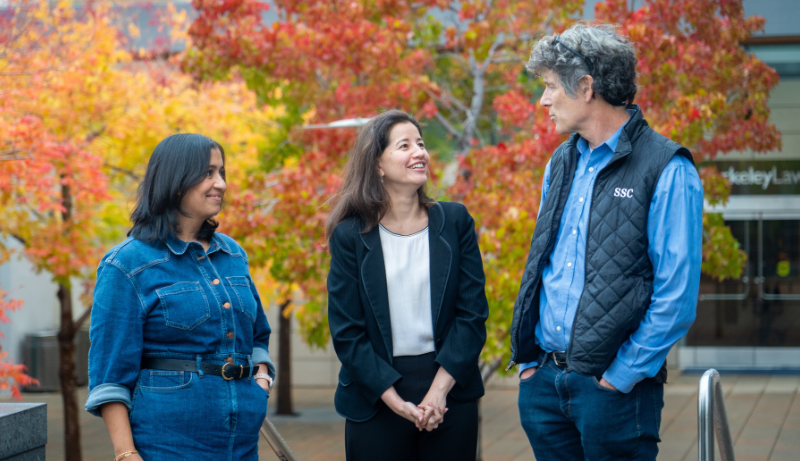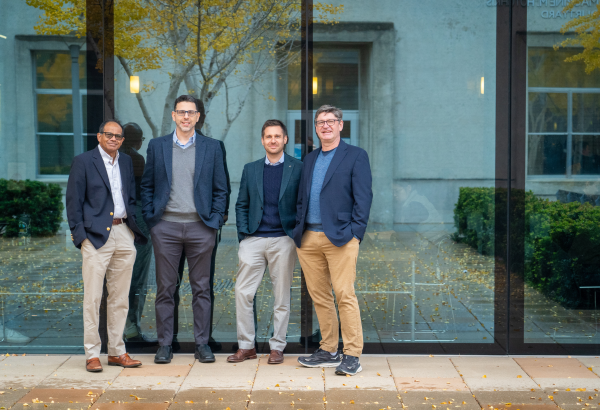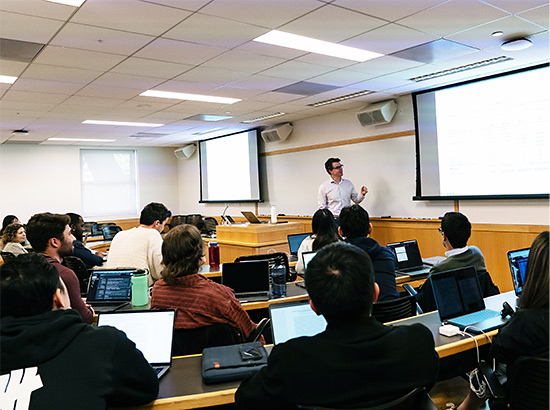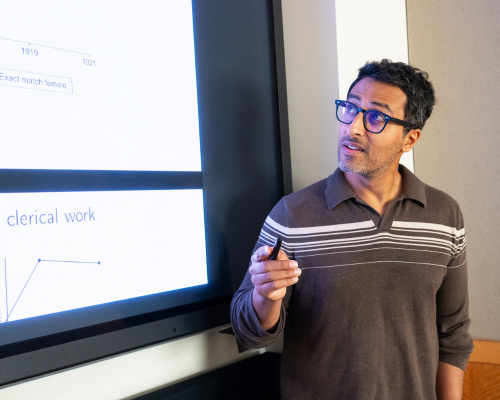
By Gwyneth K. Shaw
More than 40 years ago, UC Berkeley Law faculty helped pioneer the visionary field of law and economics. Today, a deep bench of scholars is not just upholding that tradition but advancing it.
Titans Robert Cooter and Daniel Rubinfeld — now both emeritus professors — put the school, and the field, on the map with pathbreaking research incorporating economic insights into the study of law. Cooter helped found the American Law and Economics Association in the early 1990s, served as its president in 1992, and won the organization’s Ronald H. Coase Medal “in recognition of major contributions to the field of law and economics” in 2018. Rubinfeld led the group in 2005, and Professor Aaron Edlin was at the helm in 2020.
Over the years since, UC Berkeley Law has continued to prioritize the area, hiring seven professors who specialize in the field in the past six years and bolstering course offerings for both J.D. students and those in the Ph.D.-granting Jurisprudence and Social Policy Program (JSP).
“Berkeley has played a pivotal role in the growth of law and economics,” says Edlin, who joined the law school faculty in 1998 and is also a professor in UC Berkeley’s vaunted economics department. “But even with all that history, I would say there’s been no more exciting time to be in law and economics at Berkeley than the present, given the large number of recent hires of extremely strong young people.”

Professor Andrew C. Baker agrees, saying it played a “huge factor” in his decision to accept the offer to join the faculty in 2022. Cooter, Rubinfeld, Edlin, and longtime Professor Alan Auerbach are “giants in the field,” he adds, and the school has built on that foundation with strong hiring.
“I think we have, by a not insubstantial margin, the deepest and best bench of empirical legal researchers in the country,” Baker says. “It’s a unique strength of our institution.”
Even before law and economics was formally a field of legal study, trailblazing UC Berkeley Law Professor Barbara Nachtrieb Armstrong — the school’s first and, until 1960, only woman professor — held both a J.D. and a Ph.D. in economics and wrote on wrote on social insurance programs and other related topics.
A wide range of scholarship
The crux of law and economics, Edlin says, is the idea of analyzing law from the perspective of choosing the law or legal interpretation that’s best for society, rather than textual analysis or legal philosophy. Economists have brought two main elements to law schools, he adds.
The first is thinking carefully about the incentives created by laws and legal decisions and how those decisions will change people’s lives.
“Economists study incentives and how rules will change the way people behave,” he says. “And if you’re an instrumentalist, that’s critical to thinking about what the good law is. If we’re thinking about efficiency and inefficiency, it means that conceivably, we can make everyone better off, and wouldn’t it be good to do that?”
The second major contribution of economists, Edlin notes, is methodological. Econometrics, the mathematical and statistical tools scholars economists use to analyze data, allow researchers to estimate the impact of different laws.
“Figuring that out with data, as opposed to pure theory, is a huge advance,” he says. “And the econometrics toolbox is now used by a wide range of scholars, including sociologists and political scientists.”
As it is in the broader world of legal academia, UC Berkeley Law’s law and economics faculty research questions in a wide range of fields. The largest cluster, including Professors Kenneth Ayotte, Adam Badawi J.D.’03 Ph.D. ’04, Baker, Ofer Eldar, Stavros Gadinis, Prasad Krishnamurthy, Frank Partnoy, and Steven Davidoff Solomon, focuses on the wide spectrum of business and corporate law.
Krishnamurthy, who began his career studying banking and financial regulation, has added consumer law to his scholarly interests. He overlaps there with Professor Manisha Padi, who analyzes the economics of consumer finance contracts. Professor Abhay Aneja’s work looks at how legal institutions affect economic and social inequality.
Professor Jonah B. Gelbach has applied statistical tools to court records to tease out trends in areas of civil procedure and to propose new approaches to the use of statistical evidence. Professor Veronica Aoki Santarosa, a legal and economic historian, combines original archival research and empirical analysis to study how the law creates and supports markets, with a focus on the role of legal innovations in the rise of financial capitalism and the spread of global trade.
Santarosa and Professor Dhammika Dharmapala, an expert on taxation and public finance, the economic analysis of law, and corporate finance and governance, teach courses in the JSP.
Professors Peter S. Menell and Robert P. Merges, among the architects of UC Berkeley Law’s enormous technology law footprint, bring the economist’s perspective to the intellectual property and copyright realm. International law specialists, including Gadinis and Professor Katerina Linos, use empirical tools as well.
Ripe for collaboration
Many of these scholars work together on projects. But even more important are the conversations — in offices, hallways, formal and informal workshops, and even on walks around campus — where they can discuss ideas, offer advice, and help hone statistical models or manuscripts. It’s the kind of environment academics treasure.

“It has been great to be a junior professor here at Berkeley given the cast of colleagues who can advise me on my work,” Baker says. “Especially as an empiricist, it is a massive benefit to be able to search out advice as you’re developing a project, and there are so many people here with valuable insights.”
These conversations cross-pollinate with UC Berkeley’s economics department, the Haas School of Business, and the Goldman School of Public Policy, too.
“My colleagues who are trained economists have expertise in many areas: corporate law, securities regulation, the economics of crime, discrimination, consumer protection, banking, antitrust, economic and legal history, and tax, for example,” Gelbach says. “So there’s virtually always someone to talk to about the economics of important legal questions. And of course, Berkeley’s campus has loads more economists at the very top of their fields of study.”
Santarosa says one of the school’s hallmarks is its rigorous and vibrant — yet welcoming and collegial — intellectual environment.
“It has been wonderful to experience this firsthand in conversations with my colleagues whose research spans a broad spectrum of methods and topics across law, economics, and the social sciences and who are leading the way in thinking about the legal ramifications of society’s most pressing issues,” she says. “Berkeley is a place that encourages intellectual exploration, both within the law school and across the university, and offers unparalleled support and freedom to pursue one’s own scholarly agenda.
“I appreciate the law school’s commitment to interdisciplinary cooperation across the university — we have so much to learn from each other.”
A long-term priority
UC Berkeley Law has been able to build and maintain its excellence in law and economics through a string of strong, dynamic hires at both the junior and senior level. Badawi arrived in 2017, and Partnoy the following year. Aneja, Gelbach, and Padi joined the faculty in 2019. Baker followed in 2022, and Dharmapala, Eldar, and Santarosa were hired in 2023.
Santarosa says the law school, particularly the JSP, “offers an exceptional intellectual environment for an interdisciplinary scholar like me” and that the opportunity to build on its law and economics legacy was “too good to pass up.”
“The reputation of an academic institution stems in large part from the excellence of its faculty, and its engagement with the world,” she adds. “The Berkeley brand of law and economics is truly distinctive, combining academic excellence with a broader vision of law’s social role, and our faculty in the field is stellar, large, and diverse. There are few universities that rival Berkeley in this regard.”

Outside the JSP, the Berkeley Center for Law and Business is another hub for faculty and students. Edlin leads the Law, Economics, and Politics Center, founded to strengthen ties between the law school and Haas, Goldman, and the central campus economics and political science departments. The center offers graduate student fellowships, particularly to those in the JSP, and hosts the annual Cooter-Rubinfeld Lecture in honor of the foundational scholars.
“I’m grateful to my deans and to my colleagues, particularly in the last decade, for having made it a priority to continue to strengthen the law and economics tradition at Berkeley,” Edlin says. “Because a law school doesn’t have to do that, and many don’t. But Berkeley — in part because of the JSP — has made interdisciplinary scholarship integral to the law school and to do so brought many Ph.D.s onto the faculty. ”
It’s an ideal experience, Gelbach says, and the growth of the group has made it easier to attract new colleagues.
“I think Berkeley is the best place in the world to be a law and economics scholar,” Gelbach says. “As both a student and professor, I’ve been fortunate to work and study among some of the top law and economics scholars in the world. With our combination of established senior scholars and younger folks who are making a splash, Berkeley brings an unmatched combination of depth and breadth.
“If law and economics were baseball, we’d win a lot of World Series championships.”